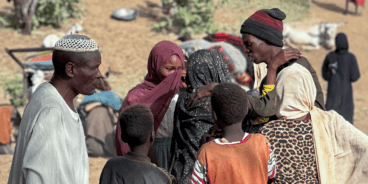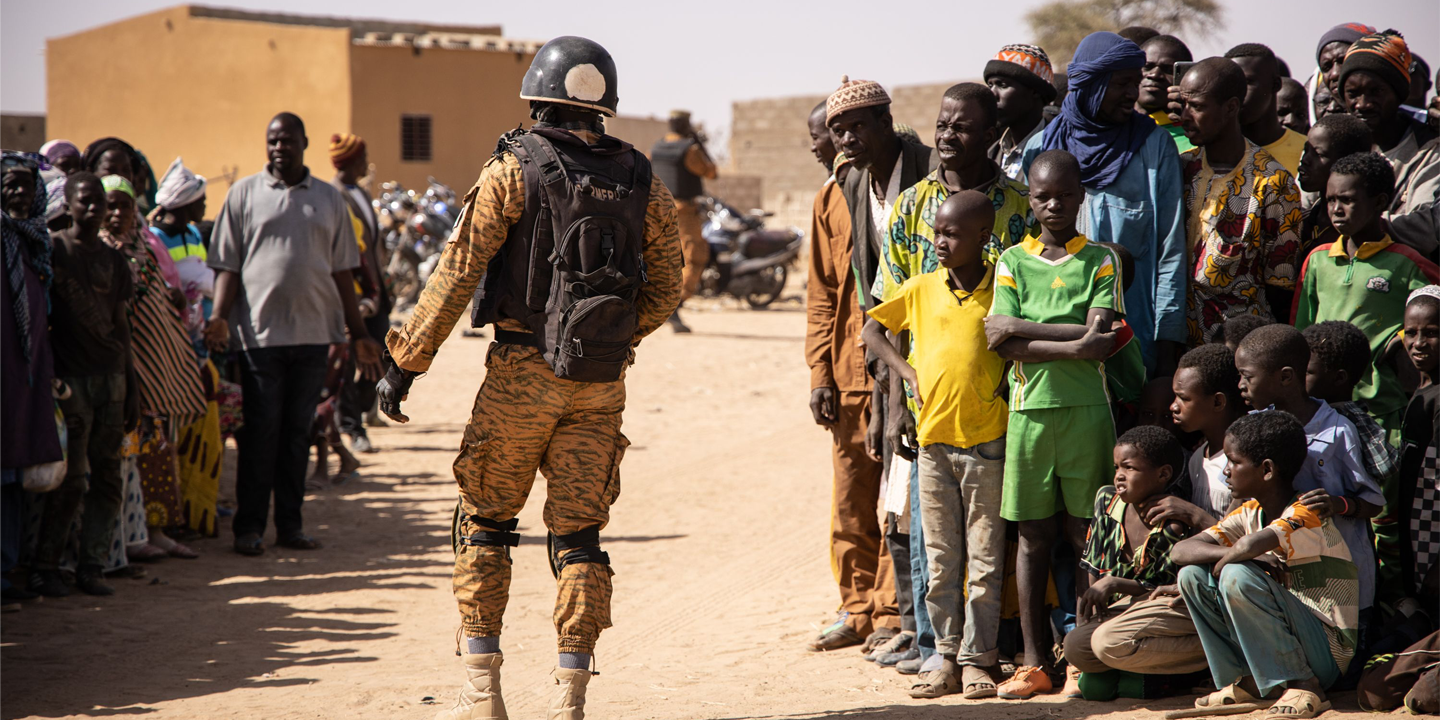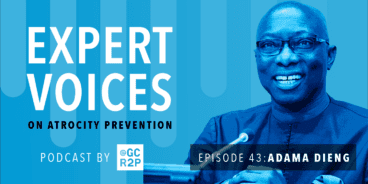

Atrocity Alert No. 215: The Sahel, Democratic Republic of the Congo and South Sudan
Atrocity Alert is a weekly publication by the Global Centre for the Responsibility to Protect highlighting situations where populations are at risk of, or are enduring, mass atrocity crimes.
Pattern of deadly violence intensifies across the Sahel
Ongoing inter-communal clashes between rival “self-defense groups” and attacks by armed Islamist groups pose a growing threat to civilians across the Sahel region. The rising violence has also created one of the fastest growing displacement crises in the world with approximately 1.3 million people internally displaced and 124,000 refugees across Burkina Faso, Mali and Niger.
Violence against civilians in the eastern region of Burkina Faso continues to escalate, with at least 11 clashes recorded since the start of August. On 7 August gunmen killed 20 civilians during an attack on a cattle market in Fada N’Gourma. A similar attack took place during May at the Kompienbiga cattle market, when 30 people were killed. Attacks in eastern Burkina Faso have increased by nearly 75 percent so far this year as compared to 2019, when violence attributed to armed Islamist groups and local self-defense groups killed almost 2,000 people.
Armed Islamist groups have also been increasingly active in the Tillabéri region of Niger, on the porous tri-border area between Burkina Faso, Mali and Niger. Last Sunday, 9 August, unidentified gunmen killed six French aid workers, their Nigerien driver and guide while they were visiting a wildlife reserve. Growing insecurity in Tillabéri has been exacerbated by the presence of armed groups, arms proliferation, growing inter-communal tensions and a climate crisis. The most recent attack indicates that violence may now be spreading to previously unaffected areas of Tillabéri.
These recent atrocities are not isolated incidents but are linked to the decline in state authority and security across the Sahel. The ongoing political crisis in Mali, as well as upcoming elections in both Burkina Faso and Niger, contributes to the risk of further instability. Alioune Tine, the UN Independent Expert on the Human Rights Situation in Mali, said that, “respect and protection of human rights in Mali are essential for a peaceful solution to the current crisis, and for security not only in the country, but also in the entire sub-region.”
The crisis in the Sahel cannot be solved by counter-terrorism measures alone. Sahelian governments should work with traditional and religious leaders to improve inter-communal relations and reduce recruitment into armed groups. Strategies to counter violent extremism and growing armed violence across the Sahel must include far-reaching reforms aimed at strengthening local governance, improving access to scarce resources and ending impunity for human rights abuses committed by both state forces and non-state armed groups.
More than 1,450 civilians killed in DR Congo since January
On Sunday, 9 August, at least 20 civilians were killed in Ituri province, Democratic Republic of the Congo (DRC), when alleged members of the Cooperative for the Development of Congo (CODECO) armed group attacked three villages. Condemning the attacks, the UN Humanitarian Coordinator in the DRC, David McLachlan-Karr, said that, “since the beginning of the year, thousands of families have been victims of uninterrupted violence, paying a high price in terms of deaths, displacement of people, loss of property and human rights violations.” More than 660,000 people have been displaced in Ituri since January.
CODECO, a predominantly ethnic Lendu armed group, has been implicated in numerous attacks on Hema villages in Ituri. The Hema and Lendu have a longstanding history of disputes over access to land and resources, including fighting in Ituri province that started in the late 1990s and resulted in thousands of deaths.
According to the UN Joint Human Rights Office in the DRC (UNJHRO), at least 700 people were killed during several waves of inter-communal violence between December 2017 and September 2019. The majority of victims were from the Hema community. The UN Office of the High Commissioner for Human Rights has indicated that CODECO and other ethnic armed groups in Ituri may be responsible for crimes against humanity.
UNJHRO recently reported that armed groups killed nearly 1,300 civilians, including 165 children, in the conflict-affected provinces of North Kivu, South Kivu, Ituri and Tanganyika between January and June this year. This is more than three times the 416 civilians killed by armed groups in the first half of 2019. Meanwhile the armed forces of the DRC were responsible for 155 extrajudicial executions. UNJHRO also reported that there were more than 400 adult victims of conflict-related sexual violence so far this year.
Jaclyn Streitfeld-Hall, Publications Director at the Global Centre for the Responsibility to Protect, noted that, “the threefold increase in civilian deaths is rooted in numerous disturbing developments over the past year – including recent inter-communal violence in the eastern provinces and the ongoing presence of armed militias competing for control of Congo’s rich resources. All unlawful killings and other human rights abuses must be thoroughly investigated and the perpetrators held accountable.”
The government and the UN Mission in the DRC must ensure that the protection of civilians remains their primary priority as military operations continue against CODECO and other non-state armed groups.
Deadly clashes between armed youths and security forces in South Sudan
At least 81 people were killed in Tonj County, Warrap State, on 8 and 9 August after a disarmament campaign led by South Sudan’s security forces turned deadly. Although it remains unclear what sparked the initial violence between several youths and security officers, the resulting clashes left at least 55 members of the security forces and 26 civilians dead.
Inter-communal violence has been rising in various parts of South Sudan. Violence in Jonglei and the Greater Pibor Administrative Area has displaced more than 60,000 people since January. During May approximately 300 people were killed when inter-communal violence erupted across 28 villages in Jonglei State.
Recurring inter-communal violence – often between rival communities fighting to control access to water and grazing land – has become increasingly militarized in South Sudan. Weak state institutions have contributed to the proliferation of arms and the creation of numerous “self-defense groups” and armed militias. At Independence Day celebrations on 9 July, President Salva Kiir announced that his government would start a “full-scale disarmament campaign” to end inter-communal violence.
Geoffrey L. Duke of the South Sudanese Action Network on Small Arms has warned against “top-down civilian disarmament,” because “approaching disarmament as a reactionary tool to address inter-communal violence will lead us back to the past, where disarmament exercises were conducted without addressing the factors that drives communities to arm themselves.”
Disarmament is one of the many issues still plaguing South Sudan despite the formal end of the country’s devastating civil war. While almost six months have passed since the formation of the Transitional Government of National Unity (TGoNU), the country’s political leaders are still struggling to implement the 2018 Revitalized Agreement on the Resolution of the Conflict in the Republic of South Sudan. The Head of the UN Mission in South Sudan, David Shearer, has said that, “the political impasse, on top of the COVID lockdown, has caused conflict to escalate with violent incidents multiplying four-fold in two years.”
The TGoNU needs to investigate the deadly clashes in Tonj County and hold those responsible for any unlawful killings accountable. Disarmament campaigns should be conducted in conjunction with confidence-building measures that address legitimate concerns regarding a lack of civilian protection, weak governance and recurring armed conflict in South Sudan.
Related Content


Expert Voices on Atrocity Prevention Episode 43: Adama Dieng
